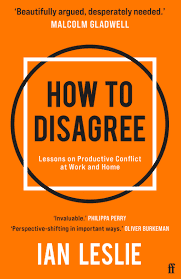Conflict has always been a challenging area for me.
If you’ve heard me share any of my stories you may know that avoiding conflict was something I struggled with for a long time.
As a child, I found conflict incredibly anxiety-inducing and would go to great lengths to avoid it, often at a huge cost to myself.
Over the years, I’ve done a lot of work, study, and research on ways to strengthen the muscle of productive disagreement. This applies to relationships at home with children, partners, friends, and family, as well as in business with colleagues, clients, and within corporate cultures.
Learning how to foster environments where it’s okay to disagree—if done the right way—has been transformative.
One pivotal moment in my journey was discovering Ian Leslie’s book, “How to Disagree.” Packed with stories and case studies, it provided a new perspective and practical strategies for embracing conflict as a constructive force.

Disagreements are an inevitable part of life, but how we handle them can make all the difference. I recently spoke to Ian, and we dove deep into the heart of why disagreement is not only necessary but also beneficial when approached correctly.
Here are some key takeaways from our discussion:
- Understanding Disagreement as a Defensive Manoeuvre:
-
- Disagreement often stems from a place of discomfort. Recognizing this can help us approach conflicts with empathy and openness rather than aggression.
- The Role of Social Media:
-
- Social media has amplified public displays of toxic conflict, making us more averse to disagreement in real life. We need to foster environments, both online and offline, where healthy debates can thrive.
- Creating a Culture of Productive Disagreement in the Workplace:
-
- Encouraging diverse viewpoints and modelling respectful disagreements can lead to richer, more innovative ideas. Leaders play a crucial role in setting this tone.
- Embracing Emotion in Disagreements:
-
- It’s not about removing emotion from disagreements but channelling it constructively. Passion can drive more meaningful and insightful conversations.
As Ian beautifully put it, “Nothing in life is as important as it seems while you are thinking about it.”
To explore these insights further, listen to the full episode here
If you found this blog useful please share!
Recent Comments